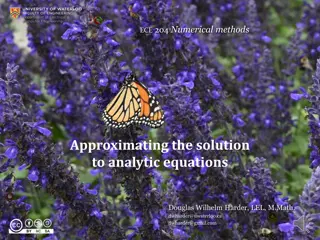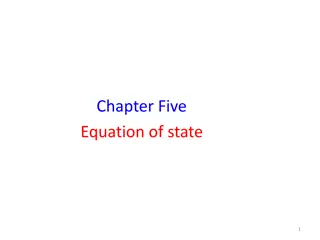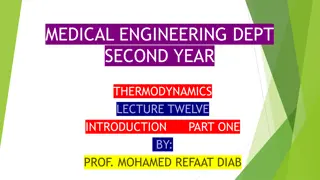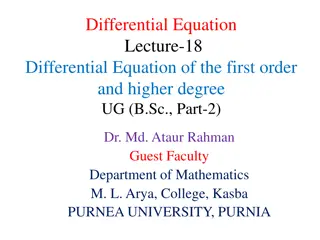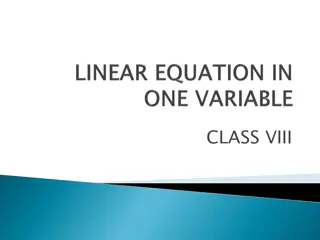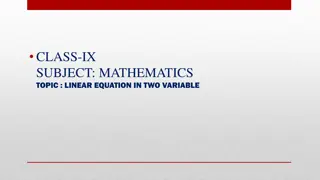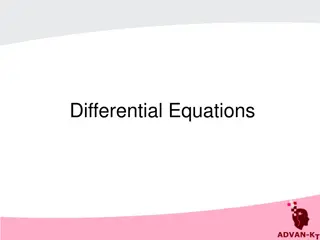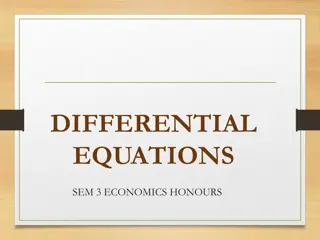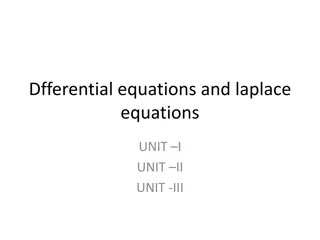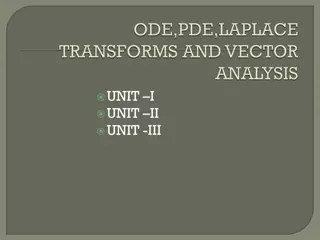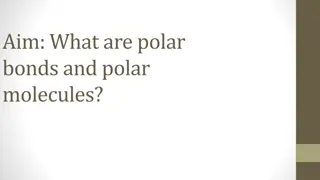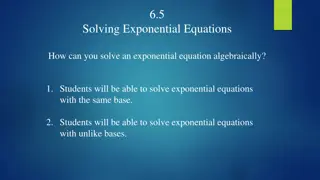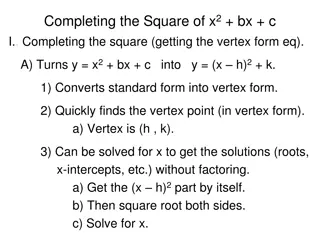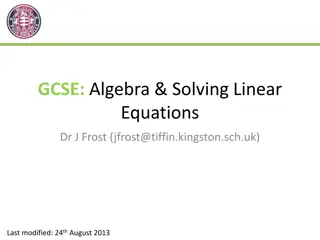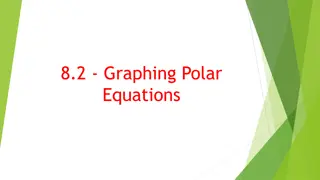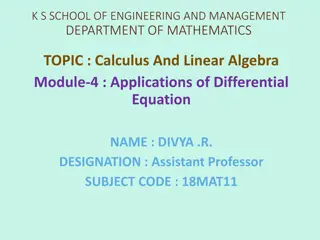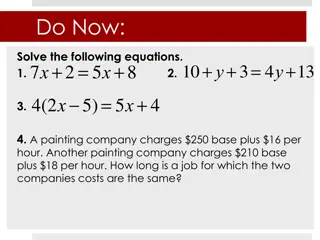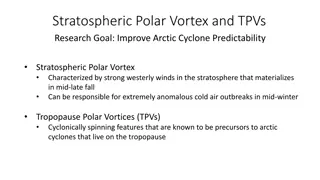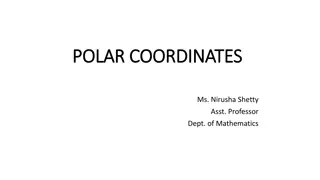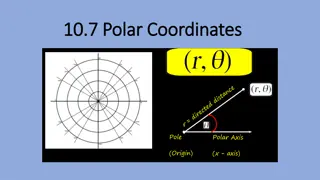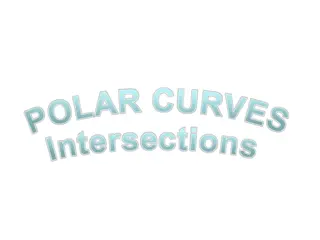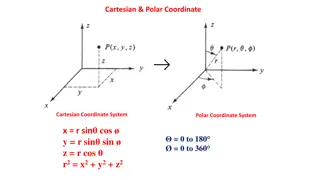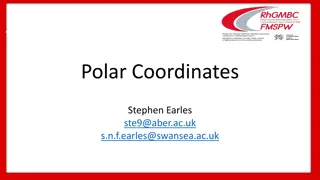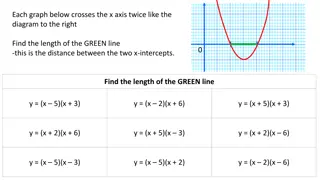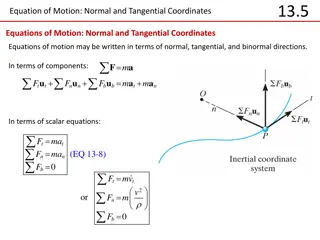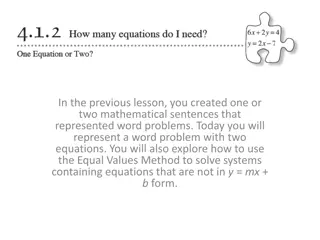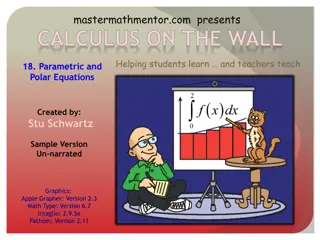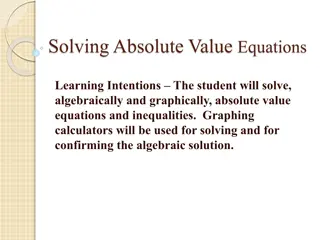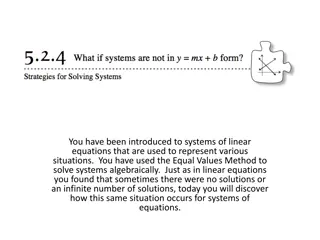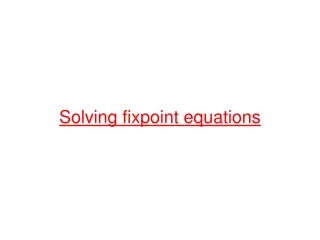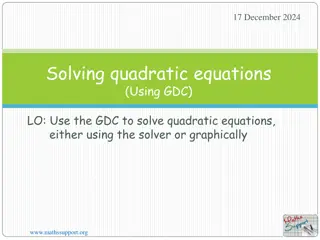Numerical Methods for Approximating Analytic Equations
Introduction to approximating solutions to analytic equations, focusing on differential equations, integral equations, and integro-differential equations. Exploring ordinary and partial derivatives, differential and integral equations, and the involvement of unknown functions and their derivatives a
4 views • 15 slides
Equations of State in Thermodynamics
In the study of thermodynamics, equations of state play a crucial role in predicting the behavior of substances based on pressure, volume, and temperature relationships. These equations define the interdependence of various intensive properties for a simple compressible substance. The development an
0 views • 42 slides
Maxwell Equations in Thermodynamics
In thermodynamics, Maxwell equations are derived using Euler's reciprocity relation. They involve characteristic functions such as internal energy, free energy, enthalpy, and Gibbs free energy, along with parameters like temperature, entropy, pressure, and volume. These equations form the foundation
1 views • 15 slides
Differential Equations of First Order & Higher Degree: Lecture 18
This lecture covers differential equations of first order but not of the first degree, general forms of such equations, methods for solving them, and examples of differential equations to be solved. The content includes detailed explanations, equations, solutions, and problem-solving techniques.
0 views • 9 slides
Linear Equations in Algebra: A Comprehensive Overview
An exploration of algebraic expressions, equations, and linear equations in one variable with detailed explanations and examples. Discover the fundamental concepts, solving methods, and applications of linear equations in various word problems. Master the art of transforming mathematical expressions
0 views • 15 slides
Linear Equations Checkpoint Activities for Year 8 Students
This diagnostic mathematics resource for Year 8 students focuses on solving linear equations through a series of Checkpoint and additional activities. Published in 2021/22, the content covers topics such as representing equations with algebra and solving for unknown variables. Students will engage w
0 views • 47 slides
Learning Linear Equations in Two Variables
Understanding linear equations in two variables is essential for solving real-life problems. This topic covers the definition, solution, and graphical representation of such equations, helping students connect mathematical concepts to practical scenarios. By learning to write and solve linear equati
3 views • 31 slides
Differential Equations: Types, Classification, and Solutions
Differential equations are mathematical equations that relate independent and dependent variables through differential coefficients. They can be classified as ordinary or partial, based on the types of derivatives involved. The order and degree of a differential equation, as well as its linearity an
4 views • 26 slides
Differential Equations in Economics Honours
Differential equations, introduced by Newton and Leibniz in the 17th century, play a key role in economics. These equations involve derivatives and represent implicit functional relationships between variables and their differentials, often related to time functions. The order and degree of a differ
1 views • 16 slides
Introduction to Differential Equations and Laplace Equations
Understanding differential equations of various orders, solving methods, linear and non-linear equations, ordinary and partial differential equations, definitions of solutions, and general vs. particular solutions in the context of Differential Equations and Laplace Equations.
4 views • 20 slides
Differential Equations: Basics to Applications
Differential equations are fundamental in mathematics, with various types such as first-order, partial, and Clairaut's equations explored in this content. The content covers general equations, solutions, and examples, providing insights into linear and higher-order equations with constant coefficien
0 views • 20 slides
Partial Differential Equations of Second Order
Exploring the concepts of second-order partial differential equations in mathematics, including the general form, linear equations with variable coefficients, and equations with constant coefficients. Learn about integral solutions, examples, and techniques for solving these equations with detailed
0 views • 21 slides
Polar Bonds and Molecules in Chemistry
Learn about polar and nonpolar covalent bonds, the classification of bonds based on electronegativity differences, and how to identify polar molecules through unequal sharing of electrons. Practice determining bond types and grasp the concept of partial charges in polar bonds.
0 views • 18 slides
Solving Exponential Equations Algebraically
Learn how to solve exponential equations algebraically with the same base and unlike bases. Understand the properties of equality for exponential equations and practice solving various equations step by step. Improve your skills in rewriting equations with the same base and applying the rules of exp
0 views • 9 slides
Soft Gamma-Ray Emissions from Pulsar Polar Caps
Soft gamma-ray emissions from the polar cap cascade region are a subject of interest in astrophysics, with studies focusing on the fundamental physical processes of pulsars and potential origins of non-thermal X-ray emissions. Researchers explore the emission processes, polar cap accelerators, casca
0 views • 16 slides
Arctic Habitat and Polar Bears: A Conservation Perspective
The Arctic habitat, home to diverse plants and animals like polar bears, faces threats such as climate change, toxic pollution, and oil exploration. Despite past population growth, polar bear numbers are now estimated to be between 22,000 to 31,000. Conservation efforts by Scandinavian countries hav
2 views • 6 slides
Conservation and Climate Change: Impact on Polar Bears
Learn about the real conditions and future possibilities of climate change on the Arctic, focusing on polar bears and their habitat. Understand how human actions, such as controlling pollution, can make a difference in protecting endangered species like polar bears from extinction due to the melting
1 views • 11 slides
Completing the Square Method: Vertex Form and Solving Equations
The Completing the Square method helps convert quadratic equations from standard form to vertex form, facilitating the quick determination of the vertex point and the solutions without factoring. By completing the square, you transform equations like y = x^2 + bx + c into y = (x − h)^2 + k, enabli
0 views • 5 slides
GCSE Algebra Revision Materials and Equations Practice
Explore a collection of GCSE algebra revision materials, including solving linear equations and common mishaps in algebraic simplification. Practice setting up equations and solving linear equations with provided examples and questions. Enhance your algebra skills through comprehensive content desig
0 views • 15 slides
Graphing Polar Equations: Examples and Symmetry Tests
Explore examples of graphing polar equations like r = 3, r = 4sin(θ), and more. Learn how to identify and graph such equations, along with tests for symmetry in polar graphs. Understand the relationship between polar axis, lines, and the pole in polar coordinate systems.
0 views • 15 slides
Applications of Differential Equations in Engineering and Mathematics
Exploring the practical applications of differential equations, specifically focusing on Newton's Law of Cooling and Orthogonal Trajectories. The concept of exact differential equations and their solutions, along with real-life examples demonstrating temperature changes over time, are discussed. Und
0 views • 11 slides
Equations and Painting Costs Analysis
In this lesson, students will solve equations involving variables on both sides to determine the number of solutions. Additionally, a comparison is made between two painting companies based on their pricing structures to find the point where their costs are equal. Various examples and concepts relat
0 views • 12 slides
Research on Stratospheric Polar Vortex and TPVs for Arctic Cyclone Predictability
This research aims to enhance predictability of Arctic cyclones by studying the Stratospheric Polar Vortex and Tropopause Polar Vortices (TPVs). The presence of strong westerly winds in the stratosphere during fall leads to anomalous cold air outbreaks in mid-winter. TPVs serve as precursors to arct
0 views • 4 slides
Polar Coordinates in Mathematics
Polar coordinates define the location of a point in terms of distance and angle from an origin. The distance is denoted by "r" and the angle by "?". However, the angle is not unique for a point. The concept involves fixing an origin and an initial ray, with positive angles measured counterclockwise.
0 views • 7 slides
Polar Coordinates in Mathematics
Polar coordinates provide an alternative way to plot points using a directed angle and distance from the origin. This system involves radius (distance) and angle measurements, allowing for multiple representations of points. Graphing polar coordinates, converting between polar and rectangular coordi
0 views • 19 slides
Polarity in Covalent Bonds
The difference between a polar molecule and a nonpolar molecule lies in the distribution of electrons. A polar molecule has an asymmetric electron distribution due to a significant difference in electronegativity, while a nonpolar molecule has a symmetric electron distribution. You can predict polar
0 views • 15 slides
Polar Curves: Intersections, Areas, and Calculating Enclosed Areas
Explore polar curves, their intersections, areas enclosed by curves, and calculating enclosed areas using given equations. Learn to sketch graphs, find points of intersection, polar coordinates, and apply formulas for finding enclosed areas with examples provided.
0 views • 21 slides
Cartesian and Polar Coordinate Systems
Explore the concepts of Cartesian and Polar coordinate systems, including their formulas and visual representations. Dive into the relationships between Cartesian and Polar coordinates, as well as their applications in mathematics and physics. Discover orbital shapes such as Px, Py, Pz, and dz2 orbi
0 views • 12 slides
Setting Up Polar Heart Rate Monitors for School Fitness Tracking
In Sun West schools, every classroom is equipped with Polar heart rate monitors for tracking student activity. By setting up Polar Beat, Flow, and Coach accounts, teachers can remotely monitor and analyze student workouts. This guide covers creating Polar Flow and Coach accounts, syncing student acc
0 views • 10 slides
Polar Plots in System Analysis
The polar plot of a sinusoidal transfer function G(jω) represents the magnitude and phase angle of G(jω) on polar coordinates as ω varies from zero to infinity. It provides valuable insights into the frequency response characteristics of a system in a single plot. By following specific steps, you
0 views • 56 slides
Introduction to Polar Coordinates: A Different Coordinate System
Exploring the concept of polar coordinates, a coordinate system introduced in the mid-seventeenth century by notable mathematicians independently. Learn about measuring angles in radians, converting between degrees and radians, and drawing graphs in polar coordinates by considering length and angle
0 views • 34 slides
Mathematical Problems Involving Graphs and Equations
The content includes a set of mathematical problems related to graphs, equations, and modeling of paths using given equations. These problems involve finding distances, heights, and intersection points based on the provided graph representations. The scenarios involve water sprinklers watering lawns
0 views • 6 slides
Equations of Motion in Normal and Tangential Coordinates
Equations of motion can be expressed in terms of normal, tangential, and binormal directions. The normal and tangential components play crucial roles in describing the motion of an object. Through scalar equations and component representations, these equations help analyze forces and acceleration in
0 views • 8 slides
Solving Word Problems with Two Equations Using the Equal Values Method
Explore how to represent word problems with two equations and solve them using the Equal Values Method. Learn how to interpret and solve systems of equations with multiple variables to find solutions for real-world scenarios. Practice converting equations into y=mx+b form for easier manipulation and
0 views • 11 slides
Solving Differential Equations: Methods and Techniques
Learn how to solve differential equations using methods like separation of variables and sketch families of solution curves. Understand the process of finding general and particular solutions to equations, and explore a variety of exercises and examples to enhance your understanding. Master the art
0 views • 16 slides
Parametric and Polar Equations in Calculus
Dive into the world of parametric and polar equations with insights on graphing, tangents, conversions between polar and rectangular coordinates, and finding the area enclosed by polar curves. Discover the power of these mathematical representations in understanding complex curves and functions.
0 views • 6 slides
Absolute Value Equations and Inequalities
In this lesson, students will learn to solve absolute value equations and inequalities both algebraically and graphically. The concept of absolute value, which represents the distance between a number and zero on the number line, is explained through examples and solutions. The importance of using g
0 views • 43 slides
Solving Systems of Linear Equations: Methods and Applications
Explore various methods for solving systems of linear equations, including the Equal Values Method and solving by inspection. Work through examples involving plant growth rates, job application tests, messy fractions, and more. Understand how to compare coefficients, constants, and graph equations t
0 views • 9 slides
Fixpoint Equations in Programming Languages
Fixpoint equations play a crucial role in programming languages for solving mutually recursive problems like parsing and dataflow analysis. This content explores the concepts of fixpoint equations, assumptions for ensuring solutions, computing solutions, and generalizations for cases with greatest e
0 views • 31 slides
Solving Quadratic Equations Using a GDC
Understanding quadratic equations and their solutions using a graphing calculator. Learn about the general form of quadratic equations, how to rearrange them, and apply the Null Factor Law to solve for roots. Utilize examples and step-by-step instructions to solve quadratic equations using a GDC, in
7 views • 22 slides
